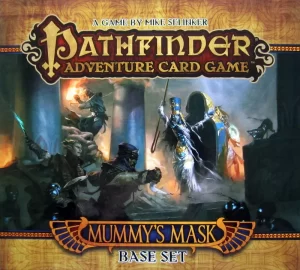When it comes to role-playing games, I enjoy running a support character. What’s the appeal, you ask? That’s a fair question. What is a support character ask those of you not into gaming? Another good query.
My newest support character is the Staff Magus Ahmotep from the Mummy’s Mask of the Pathfinder Adventure Card Game. For those of you who have no idea what I’m talking about, no worries, I’ll explain without getting too technical.
In role-playing games there are generally two kinds of characters, those who take the lead in various situations and those who tend to support them. The people who do the supporting are called Support Characters.
What is a Support Character?
I think most people prefer to play lead characters. That is to say, they like taking on the bad guy, stealing the treasure, blasting a roomful of enemies with a destructive spell. It’s pretty fun to play a lead character and I’ve done it plenty of times.
Meanwhile, a support character doesn’t really do any of those things. A support character tends to hang back to help the others. Maybe increase the damage done by the big fighter or turn the rogue invisible so she can do some good back-stabbing. In the case of Ahmotep, she grants a two-point bonus to any other character in the same location.
Don’t worry, you don’t have to understand game mechanics and I’m not going to bore you to death with anything too detailed.
My Love of the Support Character
Why do I enjoy playing a support character more than a main character? I think the appeal is I’m required to really pay attention to what is going on with all the other characters. Ahmotep can do some of her own exploring and fighting, she’s not a bad character by any means, but her biggest strength is that two-point bonus.
This means I must be aware of where the other characters are and what they are doing. I need to keep track of which character most needs that bonus and when. It’s not so easy because it requires me to think about the entirety of the situation. The more characters in the game, the more nuanced becomes my task.
Do I help the rogue in the Crypt or the mage in the Bazaar? Being a support character requires me to really pay attention to what is going on in the game. This keeps me engaged and improves my experience. I don’t let my mind wander as I complete tasks simply related to my own character. As the big fighter, it’s fairly easy to shut off the brain, rush in, and attack the biggest foe. It’s fairly straight-forward and simple and I don’t have to pay too much attention to what anyone else is doing.
I’m not Saying the Support Character is the Best
Don’t get me wrong, I do enjoy playing the brute or the damage specialist mage and I certainly don’t begrudge anyone else who does so. I’m also not saying just because someone else plays those types of characters they aren’t paying as much attention to the game as me.
What I am saying is that when I play a support character, I’m kind of playing all the other characters at the same time. If I don’t buff up the right character at the correct time it can be a disaster for the entire party. I’m more aware of the bigger picture, all the moving pieces. I enjoy that.
What about you?
Tom Liberman
